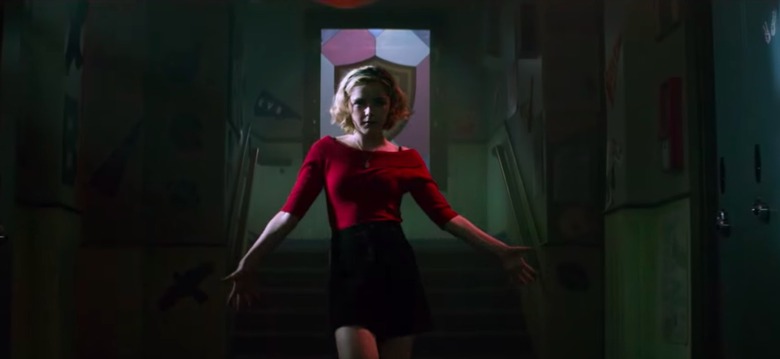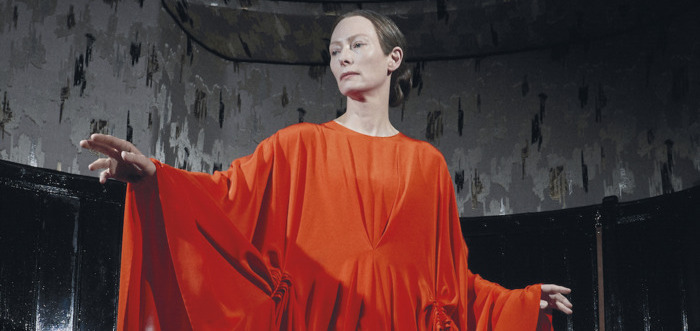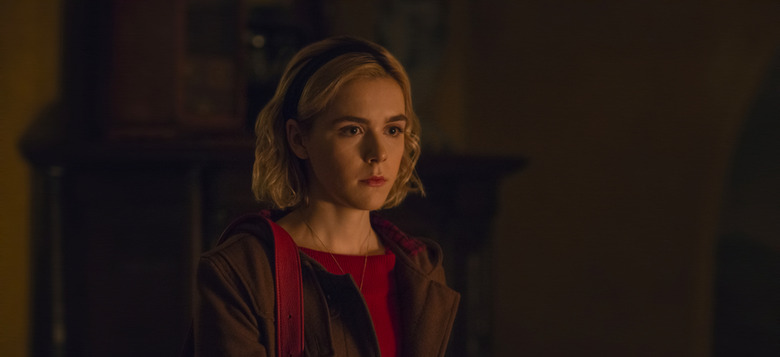Between 'Suspiria' And 'Sabrina', 2018 Is The Year Of The Witch
The popularity of witches in our culture waxes and wanes, but 2018 has been a year of occult obsession around fierce females. Witches of all kinds have been forced from the shadows as misogynists and bigots are emboldened by American's game show president. Celebrity witches like Lana Del Rey and Azealia Banks have been especially vocal lately, fictional witches are showing up on the big and small screen, and women are embracing witchcraft as a form of rebellion against the patriarchy.
According to Patricia MacCormack, an author, academic, and practitioner of chaos magic, witchcraft can be an outlet for the oppressed to find strength.
"Minority and oppressed people in the west have discovered that there is no liberation to be found in traditional patriarchal, capitalist or religious systems," she says. Many find their liberation through the faiths brought to the Americas in the African diaspora; Haitian Vodou (and its American counterpart) is both feminist and LGBTQ+ friendly. Santeria doesn't have a structural creed that prevents people from learning or practicing. For those for whom faith isn't the answer, witchcraft can still provide strength.
Identifying as a witch can mean many things. Some witches practice religious ceremonies in covens. Others view the craft as a loose assortment of beliefs. For others still, there's no religious or spiritual connotation at all. Witches are marginalized people who call upon the magic of the sacred feminine to stand up against the patriarchy and traditional Judeo-Christian "moral values". Witches are mystic radicals who tap into the Other to achieve their goals.
And of course, all of this is playing out on our screens through new movies and television shows.
Casting a Spell on the Small Screen
The television witches of 2018 are more radical than their counterparts of yesteryear. There's no sassy animatronic cat on Netflix's Chilling Adventures of Sabrina, but there's a whole host of complex issues for the teenage witch to tackle. The Charmed reboot will feature three Latina sisters, hopefully upping its woke quotient from the lily-white original series. Even American Horror Story returned to the witchy well this season, reviving many of the dead girls from Coven for a battle with the Antichrist.
On Chilling Adventures of Sabrina, teenage witch Sabrina Spellman (Kiernan Shipka) must do battle with a contingent of sexist Satanist witches and warlocks, high school drama, and the devil himself. Sabrina features a refreshingly diverse cast, though some of the marginalized characters don't get as much screen-time as they truly deserve. Thankfully, two of the strongest characters are sex-positive, queer witches of color. Ambrose (Chance Perdomo) and Prudence (Tati Gabrielle} both exude Big Witch Energy and will hopefully help Sabrina in her goal of bridging the gap between the mortal world and the witchy world. If anyone can take down the stodgy old white oppressors, it will be Sabrina and her team of misfit magic-makers.
While the Charmed reboot has only just started, another series is well into a wickedly witchy season with (occasionally smart) social commentary. American Horror Story: Apocalypse pairs the series' first and third seasons, throwing beloved characters at one another like a teenager's first fanfiction. The season initially pits season 3's coven of witches against their male counterparts, the warlocks. Things get a bit more complicated when the warlocks realize their leader is the Antichrist and they must decide which is more important to them – their gender solidarity, or their souls. It's a surprising corollary to the powerful men in our world who turn a blind eye to evil if their "team" is winning.
AHS has been on a tear with gender politics this season, but it's also taken a good look at the past treatment of the series' witches. Episode 8 called out the white witches for using voodoo when it served their need,s but seeing it as an "evil necessity", putting a name to their appropriation. Queenie (Gabourey Sidibe) is back for a third season, and her perspective has always been an important one for the series. While American Horror Story isn't perfect by a long stretch, it does get the conversation started around important issues like gender equality, racism, homophobia, and more. Plus, its witches are about to take on the Antichrist. If there isn't a more powerful metaphor for women saving the world from the patriarchy, I don't know what it is.
Dancing Daughters of Darkness – Suspiria and Its Remake
The coven of witches at the center of Dario Argento's Suspiria (1977) are some of cinema's most sinister spellcasters. Argento co-wrote the screenplay for Suspiria with Daria Nicolodi and the talented screenwriter assisted with the film's overall tone, helping the ballet students and the witches manipulating them all feel more authentically female. Despite being terrifying, it's hard not to respect the witches of Suspiria for carving out their positions of power in a patriarchal world.
In 1977, feminism was still in its second wave, rising off the power of the civil rights movements of the 1960s. Bra-burnings, birth control, and body hair were issues of the day, though there was significantly more at stake. In the film's Berlin setting, the feminist movement was even stronger, tied to antifascist rebellion following World War II. For his Suspira remake (2018), director Luca Guadagnino decided to retain the setting. The concerns about renewed fascism and fierce feminist social movements directly correlated to today's headlines, without dragging all the messes of the modern world into the story.
In the wake of the #MeToo movement and the fall of some powerful men but not others, female rage is at a boiling point. Within the feminist community, some women lash out at one another.
"I don't think female rage is exactly what I was looking for, it's more a female community and like any community you have displays of power and every relationship of power can bring with it cruelty," Guadagnino told The New York Times.
Both Suspiria films serve as a warning to witches and feminists both – we must unite against a common enemy instead of cannibalizing one another. When you're fighting against a system of oppression, the real magic is our power to find common ground.
Why Witches?
There has always been a fear of powerful women in western society. It goes back to the Judeo-Christian religions and the story of Eve, who was fooled by the devil and got the boot from Eden as a result. Jewish mysticism even tells of a first wife, Lilith, who refused to submit to Adam. She became the mother of all demons and is often associated with witches. Pandora gets the blame for releasing all evil in Greek mythology. Women who want more than what they're given or speak up for themselves have been viewed as dangerous since the beginning of Western civilization.
Despite being feared, witches have traditionally been associated with wisdom. Witches in pre-Christian Europe were usually healers and wise-women. Witches have been around since before western society became totally patriarchal, and they'll be around after. Anyone that projects the power of the sacred feminine in opposition to the patriarchy can claim the mantle of witchcraft. In some ways, witchcraft as a form of protest is like punk rock – except that it will never die. As long as there are powerful women, there will be witches, both on our screens and off.



